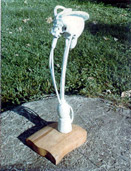April 26, 2003 Saturday Nite at the Movies
FINALLY got around to seeing Evelyn with Pierce Brosnan- it's really a story about faith. I'll likely use the Holy Trinity speech at the end to get a discussion going in a class sometime. Pretty moving coming over the screen. I generally shy away from "heartwarming" movies cause I think most of them too sentimental but this one really cranked. The blogger sez "Don't miss it."Saw Hearts in Atlantis last nite and so that makes it two winners in a row- VERY unusual for us...
April 25, 2003 nuts'n'bolts
Well I just fried a SCSI card with an old JAZ drive and now I can't get to a gig of files I was going to work on. Don't you hate it when that happens? Aaarrgh!
Oh yes,
Happy Birthday Jordan!
Anyway this is from a message sent to someone who brought up the question
last night...
April 25, 2003 Weekend discussion topic- so whaddya think? Is this logic fuzzy?
A discussion cropped up last night in regard to concern
over the song lyrics that mentioned, "praise the Holy Spirit".
I myself have scrutinized many of the most popular praise songs of this
generation and have found their lyrics wanting and in some cases blasphemous.
Upon reflection however, wading in on such a weighty topic in such an
offhanded way was probably unwise and may have been worth exactly two
cents. I'm not sure anything was gained and I may have given an unbalanced
view on my way of determining a way to navigate such issues.
I've encountered the discussion on several occasions and it is noteworthy
that there is an unhealthy disregard in the church at large for the subordinated
role the Holy Spirit enjoys in the Godhead. I am somewhat uncomfortable
in directing praise directly to the Spirit but rather through Him to the
Glory of the Triune GOD. Indeed in many services the Holy Spirit is mentioned
time and again and the name of Jesus is ignored. I am pretty sure this
grieves the Holy Spirit, as it is His work that the Father and Son be
glorified. But it is also worse to think of the persons of the Godhead
as separate beings. This separation of the Holy Spirit and the misunderstanding
of the Trinity in some churches has been one of the reasons for the proliferation
of Oneness Theology and the resurgence of modalism.
But that is a feeling not necessarily based on the witness of scripture.
Here's what I think for what it's worth: I don't dogmatically know. But
I will venture to offer some thoughts along these lines. What follows
does not demand a response- I know your time is occupied with other things.
 |
It is easy to state that, after all, the Holy Spirit IS God. I won't take time to argue for the deity of all three persons of the Trinity, since that is a given. However some of the verses that show us the deity of the Holy Spirit may offers some clues to the current question. Holy Spirit is Eternal (Ps. 139:7-10); Omnipresent- (Luke 1:35);Omnipotent- (1 Cor 2:10-11, John 14:26,16:13). Creation, impartation of life and authorship of prophecy are ascribed to the Holy Spirit. He is eternal-(Hebrews 9:14.) |
An argument might go: "If God is worthy of Worship then the Holy
Spirit is worthy of worship." However the issue is not quite so simple,
since the work of the Holy Spirit requires that He draw attention to,
illuminates and teaches us of God. His work is to glorify Christ (John
7:18) The subordination of the Spirit is a present reality. However this
subordination does not necessarily mean we are to rob Him of the love
that is due. He IS the Spirit of God and the Spirit of Christ.
Some other verses to ponder-
Matthew 4:10 "Then Jesus said to him, "Away with you, Satan!
For it is written, 'You shall worship the LORD your God, and Him only
you shall serve.'
Equality in the Godhead would seem to require equal worship. Each Person
in the Godhead is entitled to worship, and we are commanded to worship
the eternal Three. "Worship the Lord your God."
Isaiah 6:3 "And one cried to another and said: 'Holy, holy, holy
is the LORD of hosts; The whole earth is full of His glory!'
Here's an example of triune worship that confirms direct worship to the
Godhead, Father, Son and Holy Spirit. The seraphim own separately and
worship distinctly the eternal Three. Note that Isaiah 6:8 reveals counsel
in the Godhead, "Who will go for US?" Therefore it would seem
that the threefold "holy" was ascribed to the Trinity. Isaiah
6:9 is attributed in Acts 28:25,26 to the Holy Spirit. Looks to me that
the Holy Spirit received direct worship from the seraphim.
|
(NASB) Genesis 1 In the beginning God created the heavens and the earth. 2 The earth was formless and void, and darkness was over the surface of the deep, and the Spirit of God was moving over the surface of the waters. Psalms 95:6 "Oh come, let us worship
and bow down; Let us kneel before the LORD our Maker." |
In a negative sense Ananias and Sapphira lied to the
Holy Spirit and the same lie was a lie to God (Acts 5:3-5). I know of
at least one place where the Holy Spirit seems to speak as if He personally
received not something positive,worship, but rather grumblings from the
people.
Exodus 16: 7 and in the morning you will see the glory of the LORD, for
He hears your grumblings against the LORD; and what are we, that you grumble
against us?"
compare with
Psalm 95:8 Do not harden your hearts, as at Meribah,
As in the day of Massah in the wilderness,
9 "When your fathers tested Me,
They tried Me, though they had seen My work.
10 "For forty years I loathed that generation,
And said they are a people who err in their heart,
And they do not know My ways.
11 "Therefore I swore in My anger,
Truly they shall not enter into My rest."
And then
Hebrews 3
7 Therefore, just as the Holy Spirit says,
" TODAY IF YOU HEAR HIS VOICE,
8 DO NOT HARDEN YOUR HEARTS AS WHEN THEY PROVOKED ME,
AS IN THE DAY OF TRIAL IN THE WILDERNESS,
9 WHERE YOUR FATHERS TRIED Me BY TESTING Me,
AND SAW MY WORKS FOR FORTY YEARS.
How about Ezekiel 37:9 "Also He said to me, Prophesy to the breath,
prophesy, son of man, and say to the breath, Thus says the Lord GOD: Come
from the four winds, O breath, and breathe on these slain, that they may
live."
Here, I think a case can be made that this is a Biblical example of direct
request to the Holy Spirit. We have another such example in Song of Solomon
4:16, metaphorically requesting the breath of life of the Holy Spirit.
John 16:13 "However, when He, the Spirit of truth, has come, He will
guide you into all truth; for He will not speak on His own authority,
but whatever He hears He will speak; and He will tell you things to come."
I like the NASB better:
John 16: 13"But when He, the Spirit of truth, comes, He will guide
you into all the truth; for He will not speak on His own initiative, but
whatever He hears, He will speak; and He will disclose to you what is
to come.
I could use your help with the Greek on this one- I audited a Greek course
at SMU (figured that was one thing they couldn't mess up too badly!) and
am mostly self taught- just enough of a command to use my Big Kittel.
This verse has been interpreted to mean that the Spirit does not speak
of Himself - so the believer should not be occupied with the Spirit either-But
does the verse say that? Seems to me the verse means that the Holy Spirit
does not speak from Himself, that is, independently of the Father and
the Son. As the Son came to serve the Father, so the Spirit is here to
serve the Son. This verse speaks of the administrative position of the
Spirit.
In a similar way Jesus says
John 12:49 "For I have not spoken on My own authority; but the Father
who sent Me gave Me a command, what I should say and what I should speak."
It is significant that there is no Scripture to forbid worship or direct
address to the Holy Spirit.
Matthew 28:19 "Go therefore and make disciples of all the nations,
baptizing them in the name of the Father and of the Son and of the Holy
Spirit,"
The Spirit is equally worshipped and surrendered to and revered, along
with the Father and the Son in the devoted act of baptism. It would seem
from this example that we can render worship to the Holy Spirit. The Spirit
loves us (Romans 15:30 ). Nowhere are we forbidden to love Him in return.
Remember Numbers 6:24-26 is invoking the blessing of the three Persons
in the Godhead. (Revelation 1:4,6 ).
|
Note that the Holy Spirit in 1 Corinthians 12:5, and in 2 Corinthians 3:17, is designated "Lord". We have the highest authority for the direct request of, and worship of the Holy Spirit. |
 |
Another argument from inference: I would argue that
His present role does not abrogate His nature and His nature is praiseworthy.
Indeed, the Son is subordinated to the Father but in Matt 14:33, 28:9,
Luke 24:52 Jesus receives worship even before His glorification and ascension
and exaltation by the Father. Jesus prays that the Father glorify Him
with the glory He shared from eternity. Therfore, the work of Christ did
not preclude him from receiving praise. God is a trinity of persons, three
hypostases in one ousia, all of whom are rightly to be regarded as deity
or God.
My bottom line? Subordination is a negative word in our culture, but not
Biblically- the worth of the subordinate one is not less that the one
subordinated to. I think therefore that the relationship of the two persons
does not demand we deny the Holy Spirit 's worthiness to be praised. And
ascribing worth to One who is worthy is a just and righteousness thing.
It is the most right thing we can do.
So then that leaves the question: does the subordinate roles of Christ
and the Spirit to the Father necessarily impact how we EXPRESS and DECLARE
our praise? If you come to any conclusion, please let me know.
Anthony Foster
April 24, 2003 Mysterium Tremendum
| Wounded hands Pierced brow Broken heart Bleeding now All for Love All with Grace All for his own From a fallen race. Great exchange Mystery! Dying God Obscenity! Now behold A slaughtered lamb Lays down life To rise again! King of Kings Lord or Lords God of Gods Word of Words Risen scapegoat Kills the grave Death is dead I am saved! |
|
April 24, 2003 Bibliography
A list of books on Christian responsibilities in the Arts- much more to be updated later... Ypou can see from it that the discussion goes back a loooonnng time...
April 23, 2003 A Proposal for a Third Way
Here I attempt to describe an set of alternative stylistic distinctives for a Biblical church for such a time as this.
April 23, 2003 Balding but Not (Necessarily) Befuddled
 |
I have always preferred the metaphor of the plough to the usage it had in my boyhood days when I actually had to operate one of these things as well as feed and water the mules we used to pull them. I am in my forties and rarely meet anyone that is less than double my age that can relate. |
It is impossible to stay abreast
of current trends in theology and body life without encountering the harrowing
of the modern landscape by the plough of time. A plough disturbs and redistributes
the soil, destroying and tilling at the same time. The turning and churning
of the philosophical soil has seen the emergence of the anti-philosopophy
of postmoderism.
Many have cried out for a new nomenclature for the negative construct of postmodernism is actually a reaction to the decline and some say demise of modernism as a viable context in which to operate. There is a tidal shift in popular thinking in the Westone which invites us to engage with and enter into a conversation, even where we are not setting the agenda. This happens to be occurring at a time when the philosophical moorings of the western world have been ³assassinated² as Peter Jones has said.
The church
operates in this milieu and as in every generation partially defines
itself based on its interactions with the culture it is sent on mission
to. I have read with an eye toward making some sense out of all the competing
voices in the church as to how mission might best be approached in the
anti-absolutist, anti-logical world that has emerged.
To that end I have been reading- every book Leonard
Sweet has written since 1991, along with liberal doses of Brian
McLaren, Chuck
Smith Junior, Robert
Webber, Tony
Jones, et al. I have also studied the constructs that have trickled
down into popular culture as articulated by Derrida, Foucoult, Rorty and
others, and as exposited and interpreted for the Christian mind by Grenz,
Middleton, and many others in the Christian camp. At the grassroots level,
I have regularly read and interacted with dozens of so called postmodern-emergent-alternative
worship - type
weblogs- the emergent culture's medium of choice.
What Iıve learned, is one size does not fit all- it is evident that ministries
abound that owe their nascence to excesses of liberalism as well as those
who are cast offs from conservative evangelical ecclesiastical dogmas.
In most cases, the ilk and or background context of the leadership determines
the theological moorings of the emergent work.
Definitions of Internet terms are constantly changing, so there are many
ideas of what
a weblog is and should be. As for the blogs, this is where the front
line workers in the emergent church air their grievances, dialogue with
others, and journal their experiences. It is most instructive to read
them. It is also amazing how many are politically leftist in their tone.
They sometimes prickle quickly at reasonable challenges to their way of
doing things and their opinions. Then, on the other, other hand, some
are equally thoughtful and insightful. I tend to return to the ones that
journal a life on the edge of ministry, living a life of service and wondering
about the effectiveness of their sacrificial work among a neopagan culture.
These tend to view their online journaling as a vital extension of creating
community they are consciously based on the spiritual discipline of
writing to sort out the real from the unreal, the authentic from the inauthentic.
Many struggle to free themselves from attempting transferrance of what
is working elsewhere into their own contexts, as they realize that in
doing so they are violating their own search for authenticity.
| The modern church divided itself into the ecumenical and the evangelical- I would say these distinctions abide, though now ecumenism presents itself under the rubric of neo-orthodoxy.I would also observe that in the emergent church, a trend toward communication via image and story has in many cases supplanted the primacy and mastery of the Word in the area of objective, absolute truth- thus the postmodern de-construction of metanarrative has impacted the worldview of some emergents. They have embraced what they see as an equalizer in the postmodern ethic of equally valuing and at the same time devaluing all worldviews. Yet the only true equalizer is the approach to cross. |
Christianity can only find its place in truth by entering into dialogue
with, and being allowed to stand up against the truth claims of others.
Christianity is only as valid (at the outset) as any other truth-claim.
It is only by allowing the validity of expression of other points that
the validity can be established. Several po-mo ministers I know operate
outside the modern camp because there was nowhere else for them to go.
The modern model for ministry had become so tight that the slightest variance
from the acceptable norm was considered almost heretical. Divisions abounded
over differences in ministry vision statements.
I would observe that the leaders of most postmodern churches I have had
dealings with tend to be "intuitive" personality
types, and modern churches are led by "sensing" types. Intuitives
perceive ministry abstractly, preferring to create a context for building
relationships. The challenge remains that it must never be at the expense
of the straight-forward Gospel. In this case this is an issue of variety
in form, not function. That sounds familiar as forms change constantly.In
fact many in the emergent church are attempting to reclaim forms from
the ancient past- these are seen as more pure and unadulterated by the
influences of modernity. Postmodernity invites us to examine afresh what
we mean by truth, and what we claim to be truth. It invites us to turn
the lifght of scripture on our own truth claims.
| One of the key areas in which modernism has failed, according to voices in the emergent camp is this devaluing of relationship by moderns. They deny that there is true value in defining people by their common characteristics,, but fall into that trap themselves. This is a modern strategy the emergent church grapples with. But nobody goes to heaven because they're part of some targeted ministry to their specific mindset and lifestyle. We are all immersed in a culture where if we are truly in touch with people, they impact us. |
Ministry is unto God, but God ordained that it be enacted in relationship to people. And people don't fit into boxes any more than God does.
More blog-thoughts for offline discussion
Distillations from readings and ponderings- Any philosophy
or antiphilosophy if left to themselves lead to nihilism, apart from a
grasp of the grace of a God who cares enough to speak and to act. Both
modernism and postmodernism (or any other of the world's isms) are flawed
in that they are man centered. Emergents have made some important points
with their appeal to using narrative themes, their emphasis on mystery
and transcendence. That's a theme I advanced years befor I first heard
that modernism was had failed (about 1984- That was in days of art history
discussions about Suzi Gablik's book to that effect) Moderns are accused
of "foundationalism" for insisting on inerrancy. Postmodern Christians
know there is a meta-narrative and absolute truth.
Another excess is that trends in emergent ministry locate far too much
authority in communities without fully considering the impact of human
depravity upon man whether in communities or individually. All these ideas
are not isolated one from the other. If logic and persuasion don't work
to enable us to discuss and decide peacefully, then all you have left
is force-we need to learn how to minister in a postmodern climate without
caving in to postmodernism's demands. To articulate in a loving and forthright
way the truth of Christ in a culture that denies truth is one of the challenges
of our day, just as it was when Peter wrote 1
Peter 3:15.
Romans
12:4-5 reminds us we are "members one of another." So letıs all remember
that in our discourses and make our interactions intentional in nature.
The great commandment and the great commission have not changed. As someone
somewhere said, "People are not desperate for our programs, they're
desperate for our message". Christian truth claims are not just one
among many- they are exclusive in nature in one sense, the efficacy of
the cross, and inclusive in another way- that all things be done to the
glory of God.
I hope we also remember that when most of the world does not have the technology to make a phone call, concerns with postmodern culture is fairly elitist in nature and tends to focus its attention on the upwardly mobile sect of the human race united by technology. Inherent in this is the danger of the emergent church becoming more marginalized in a way that the modern church ever attained to.
Anthony Foster
April 22, 2003 Upstairs, Downstairs
 |
Once there was a town with many beautiful mansions. The mansions were so designed that each had a cellar, a ground floor and a first floor. They were arranged so that one could distinctly see that there was a ranking to be associated with the dwellers on each floor. The majority of the townspeople preferred living in the cellars. They found pleasure in the cellar. They never had to climb stairs, and they filled their cellars with all the things they could find in order to keep their needs met. One day a young man, who was accustomed to living in the upper levels of his mansion came to a town meeting. He posed the question as to why most of the people preferred living in the cellar of their mansions when the whole house was at their disposal. The townspeople became furious at this- for anyone to be audacious enough to propose that they should do things differently that to what they were used to- for in fact, they were dwelling in their own houses! The townspeople, then furious, reacted to this impertinence by running the young man out of town. - a parable by Kierkegaard |
April 21 FlickerWeb et. al.
This is a resource for using images in worship.
And here is the Online Labyrinth.
He Is Risen Flash file
April 21 AfterLent
| Ok Ok this was the first Easter I can ever remember when Earnie and I didn't have a chocolate bunny. So when the bookstore had Cadbury's Eggs for 30 percent off I almost couldn't resist. This was a deliberate boycott of any Easter paraphanalia that drew attention from Christ's atoning sacrifice. I remember an Alexander Colunga exhibition I designed in the early nineties that had a picture of a crucified snowman in it- a starkly real protest of the de-christification of Christmas. So here's a take on the Easter bunny that's similar- a call to understand that without the centrality of the death burial and resurrection of the Son of God we might as well being appealing to the Easter Bunny for our salvation. |  |
April 21 Signs of the Times
|
Thanks to Rippy! I had seen this one I think years ago... |
Recreation of a sign I saw after 9-11-01- A definite disconnect. When will America Bless God? |
April 20 Resurrection Sunday! What a great Easter weekend!
Starting with Maundy Thursday we finished up the PDL study with a small but intimate group. I really didn't know what to expect as many of the group tend to be quiet. Some were involved with prep for Easter and family coming in, so we were operating at about half size. Several, like me- had been caught in a jam that prevented us from getting home because of a wreck on the Chain of Rocks bridge. so some time was taken to clear our minds from distractions. (One thing I look forward to in Heaven- no distractions!)
I purposefully scheduled the final study to coincide
with Lent and the final meeting on Maundy Thursday. This was so appropriate-
we talked about and reflected on this evening when Jesus observed the
final passover with his disciples and then went to Gethsemane to fulfill
the purpose for which he came to the earth. We discussed how we all have
to ongoingly go to Gethsemane to declare "Thy Will be Done"
in our lives. This made it an especially meaningful and rightly focused
time for us as we shared our purpose statements.
I was stirred by the blatant REGARD for God's glory that the study class
demonstrated in their very thoughtful responses- they were so God glorifying
and God centered! The Spirit created a sacred space around us as we exhorted
and encouraged each other.
Some shared the struggle they had before the Lord in examining themselves in the Light of what it means to conform to the likeness of Christ. One shared emotionally how this had helped her realize not only the holiness and love of God in general but that this was a personal, relational love that made her desire holiness as she grew know God more intimately. Glory be to God Most High!
I had tried to direct our attention to this aspect throughout the study. The extra lessons I wrote and distributed were proclaimed successful and very helpful by the participants.
|
Awaiting a Kiss From God This is about our resurrection. |
Heart Beating Against the Walls of Its Time- Cast Bronze This is about Christ's Resurrection |
For these and more visit Neverwas
Easter Weekend Continued
After the time together, Earnie and I went home and watched the second part of Jesus of Nazareth DVD I got this week. After all these years, I still get chills and weep openly at parts of it. This was one of those occasions where self control is not required-I think it helped us develop a proper atmosphere of worship in our home as we watched and discussed the film this week.On Friday we planted flowers, cleaned up the yard and prepared for big trash pickup on Monday. An annual purging event for the Fosters. we only take good to new items to Goodwill, DAV and the Pantry, so we had quite a bit of remaining junk to dispose of. Sort of a reflection of the spiritual exercises we had gone through during Lent. I've been thinking that the fruit of a life well lived with enable us to nourish and meet needs in the world and the body, but the necessity for purging the extra spiritual junk that accumulates is a discipline we cannot afford to forego as well.
We went to a Good Friday service at Winstanley Baptist Church, our first visit there. As we participated in the service, I found my heart warmed by two things- first the one anotherness I felt toward these believers who I had never met- we were experiencing adoration for the same sacrifice even theough we didn't know each other. Also as I looked on the faces of the participants in the choir and the seven last words candle ceremony I remembered how much like the little Baptist church I grew up in this church was. While we have moved beyond these expressions formally, functionally we have strong ties to this simple mode of adoration.
Saturday was beautiful in spite of a little rain. I was able after chores to compose the music for several more songs. I had a long dry spell from 1999- 2001 and most of the lyrics from that itime were never set to music. Then in 2001- the present the songs have been flowing so freely that the old ones got shelved. I hope to take a sabbatical during the time when Earnie goes to the Precept Conference to steal away to the mountains and write music. That would be GOOD.
I was able to spend some time studying the concept of Authority in scripture and its implications for how we relate to to God in anticipation of a discussion of Sovereignty with a friend.
Sunday we worshipped at CBC and were treated to a simple but clear presentation of the post resurrection appearances of Christ- focusing on the fact of the resurrection as the surety of our redemption.
One notable if unexpected grace I will mention among the many lavish graces God has bestowed on is in this season: - We communed with a church that knows how to respond to the declaration: "Christ is Risen" (He is Risen Indeed!) I have gotten used to responses such as, sure, oh yeah, that's right where we have been ministering these past four years. I know it's just form but it's welcome nonetheless. Familiar forms are great if they don't become a straightjacket. One thing for sure -we have been well out of our comfort zone and having grown considerably and having learned to exercise never used spiritual muscles for this time, it is imperative that we do not forget the lessons learned if and whan God leads us back into a scenario that is more attuned to our aesthetics and sensibilities.
The rest of the day we spent with dear friends visiting in our home and that evening family devotions were centered on this lesson by John Piper from 1986: The Marvelous Rising of a Rejected Stone. Check it out for yourself!
| Hmmm... I can't find it now but I remember Idid some teaching on the cornerstone/capstone concepts when teaching through Daniel- I'll find it and post it here.. |  |
Check out this Gethsemene swf at scratchthesky. Flash plugin required.
Also check out




